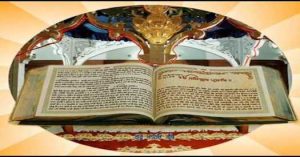When recording devices first appeared, the full Paath of Sri Guru Granth Sahib Ji was recorded on spool recorders. These recorders were expensive and rather clumsy. Often the spools got caught. Even a slight bend in the spool tape would cause it to get stuck.
Then came the cassette tapes from the sixties. These were easier to handle and the masses had access to them.
It was only in the late 80’s that the entire Paath of SGGS Ji was recorded in a proper sound studio. The Paath was read by Professor Satnam Singh Sethi. He had a clear, high pitched voice. Moreover he had been doing Kirtan for many years and pauses (bisraams) were mostly well placed as he read the Paath. Certain parts of the Bani, like Jaitsri Ki Vaar, Sehskritee Sloks, Bhatt Sawaiyye was read by the late Sant Singh Maskeen in a rich tone. In the background was the sound of a veena, lending a subtle, somber air.
In this clip (available on YouTube), the Pathi Singh reads Gurbani from Anggs 842 till 857.
The first Shabad is by Guru Amardas Ji. Guru Ji tells us of the foolish ones who rely on auspicious dates to do their activities. Guru Ji says reliance on such dates is “dujja” i.e. reliance on aspects of maya. A gurmukh relies only on One Nirankar Ji.
As you listen to the Paath look out for Guru Ji’s Blessed Words which say,
“Aape Pura kare so hoye; eh thithi vaar dujja hoye; Satgur bajho andh gubaar; thithi var seveh mugadh gavaar; Nanak gurmukh bujhe sojhi paaye; Eikat Naam sada rehiya samaaye.”
Then, there are 2 Shantts by M.1. from Angg 843 till 844. These speak of the jeev isteri pining for Union with the Lord.
There are 2 Shantt Mangal (joy) by M.4 . The joy is of Union. The jeev isteri says,
“mera Har Prabh sejhe aaya mann sukh samanaa Raam.”
From Angg 845 till 847, there are 3 Shantts by M.5, and 2 Shantt Mangal from Anggs 847 – 848. Although the 3 Shantts are not titled as Mangal, the content is certainly of the mangal state of Union. The 1st Shantt for example says,
“Mangal saaj bheya Prabh apna gaaya Raam”, while the 2nd Shantt says,
“Sunn salhi sahelrhiyo milh mangal gaavhe Raam.”

Bilawal Ki Vaar M.4. comes next, from Angg 849 till 855.
Bilawal means true happiness, joy or bliss. The thrust of the Vaar is that True Bilawal or joy only comes from Singing the Lord’s Praises.
“Bilawal tabh hi kijiye jab mukh hovay Naam.”
The Vaar also tells us that those who do not have Naam are the real bankrupts. In those days, when a trader went bankrupt and could not pay his creditors, he would light candles or lamps at 4 corners of his shop or house to indicate “mera diwala nikal gya.”
Thus, at Angg 852, Guru Ji says those who do not have Naam in them are the truly bankrupt ones.
” Jinni gurmukh Har Naam Dhan na khatiyo se dewaliye jugh mahe.”
In the final pauri (13) of the Vaar, Guru Ji tells us about the nindaks of the Satguru. The Satguru is Ever Forgiving. If a nindak goes to the Satguru and asks for forgiveness, the Satguru enjoins him to Satsanggat to wash off his lekhas. Just as rain washes off dirt and fills up streams and riverlets to flow in the Ganges (Pura Satguru), all waters (nindaks) are rendered clean and their lekhas are washed off.
“Koyi nindak hovay Satguru ka firh Sharan Gur aavhe; pichle gunah Satgur baksh leh Satsanggat naal ralaave; jio mih vuthe gallian nallian tobian ka jalh jaye pavhe vich Sursari Sursari milat pavitar paavan hoye jaavhe; eh vadiaiyee Satgur Niravir vich jit miliye tisna bhukh utreh Har shaant tarh aavhe; Nanak eh achraj dekho mere Har Sache Shah ka je Satguru nu manne so sabna bhaave.”
Finally, the clip has 12 Shabads by Bhagat Kabir Ji from Angg 855 – 857.
At Angg 855, Bhagat Ji tells us it is futile to run away from the world and live in forests, hoping to purify oneself. The impurities are etched in the mind and will follow you everywhere. To remove these lekhas of sins, paap, you need to fall at the Feet (Bani) of the Satguru/God, and in utter humility plead to be saved.
“Kaho Kabir mere Madhva Tu Sarab Biapee; Tum samsar nahi Dyal mohe samsar paapi.”
In the final line of Shabad no 12, Bhagat Ji says his base mind was saved and purified, when the Lord blessed him with Prema Bhagti, Love for God.
“Kahe Kabir mera mann maaniya Raam Preet kiyo leh Dev.”
These are just some observations. Listen to the clip and enjoy the Divine Bliss of Naam. Churn (Vichaar) the Wisdom of Bani in each Priceless Shabad, and apply it to yourselves.
Shabad Veechar by Bhai Manjeet Singh Ji
Bani is available on YouTube


